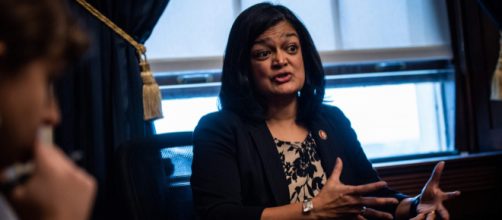Just days ago, Democrats in the House of Representatives, spearheaded by Vermont Senator Bernie Sanders, introduced what is being called the party's most ambitious health care bill in anyone's memory, dubbed the Medicare for All Act of 2019.
This bill was released by Rep. Pramila Jayapal (D-Wash.) on Wednesday, February 27, and although similar bills have been introduced in recent years in Congress, this one goes above and beyond any of them.
Jayapal's version would guarantee every American access to medical, dental and vision benefits while eliminating premiums.
Unlike the previous version of this bill, which was introduced by Sanders in 2017, this iteration would transition every citizen from their current private insurer (or no insurance, as is the case for an estimated 30 million Americans) onto the proposed system within two years instead of the four years outlined by Sanders.
Medicare for All is becoming a mainstream idea
Just under four years ago, when Sanders, a self-described democratic socialist, announced he was running for the Democratic Party's nomination in the 2016 presidential election, universal health care, one of his pet issues, was considered a fringe, extremist issue by people on both sides of the aisle.
But Sanders' insistence on revamping America's health care system and the delivery of its services into a model that is more akin to what most other first world nations have has apparently moved the needle, so to speak.
In recent years, other prominent Democrats, such as Massachusetts Senator Elizabeth Warren, New Jersey Senator Cory Booker and California Senator Kamala Harris, all of whom are running for president in 2020, have come out in favor of some sort of universal health care system.
The most popular model that is being supported by the left wing of the party is a "Medicare for All" system, which, in essence, would expand America's current Medicare system, which is currently only available to individuals who are either over age 65 or considered disabled and unable to work, to every U.S. citizen. In past years, Rep. John Conyers of Michigan introduced legislation that would implement such a system.
Conyers struggled to find co-sponsors, but in 2017, the idea started to catch on, and just last year Representatives Pramila Jayapal, Debbie Dingell, and Keith Ellison started the Medicare for All Caucus in the House of Representatives.
From its inception, it had 70 members.
Now in 2019, with a majority of the seats in the House, Democrats are making perhaps their biggest push towards making universal health care the law.
Trying to pass universal health care is a Democratic party tradition
In decades past, leading politicians on the left looked to provide guaranteed health care for all Americans at no cost, starting with President Franklin D Roosevelt in his 1944 proposal for a "Second Bill of Rights." Later, Senator Ted Kennedy looked to make the fight for a national health care system his life's mission.
With the Democratic Party's move to the center of the political spectrum at the end of the 1980s, they put the issue on the backburner, instead of looking to make incremental improvements to America's existing system that would work in concert with private insurance carriers and for-profit hospitals and medical centers.
This was made evident when former President Barack Obama's Affordable Care Act was passed several years ago, which lacked a public option and was actually considered by some to be a boon to insurance companies.
But with the emergence of Sanders as a major influence on Democrats and their policy proposals, the party as a whole has started to move sharply to the left on health care, although there are still some holdouts when it comes to a Medicare for All system, such as Speaker of the House Nancy Pelosi.
The GOP doesn't like it, and neither do some Democrats
Moderate and left-of-center Democrats feel that switching to universal health care would be too drastic a change. New York Magazine notes that some simply want more incremental changes to the Affordable Care Act or to expand private coverage.
Other ideas being championed by centrist Democrats include allowing people between the ages of 50 to 64 to "buy-in" to the current Medicare system.
The Republican party, now led largely by President Donald Trump, has always been a thorn in the side of any sort of Democratic party proposal to expand health care coverage or benefits. For the last few years, Republicans in both houses of Congress have tried but failed, to repeal the Affordable Care Act and remove protections for people with pre-existing conditions.
Among other things, the GOP has cited the extremely high cost of implementing the Medicare for All Act of 2019 as a reason for why it is either unrealistic or simply a bad idea. It has been estimated that such a system will cost taxpayers about $30 trillion dollars, and the bill doesn't offer any solutions on how the federal government would procure such funds.


